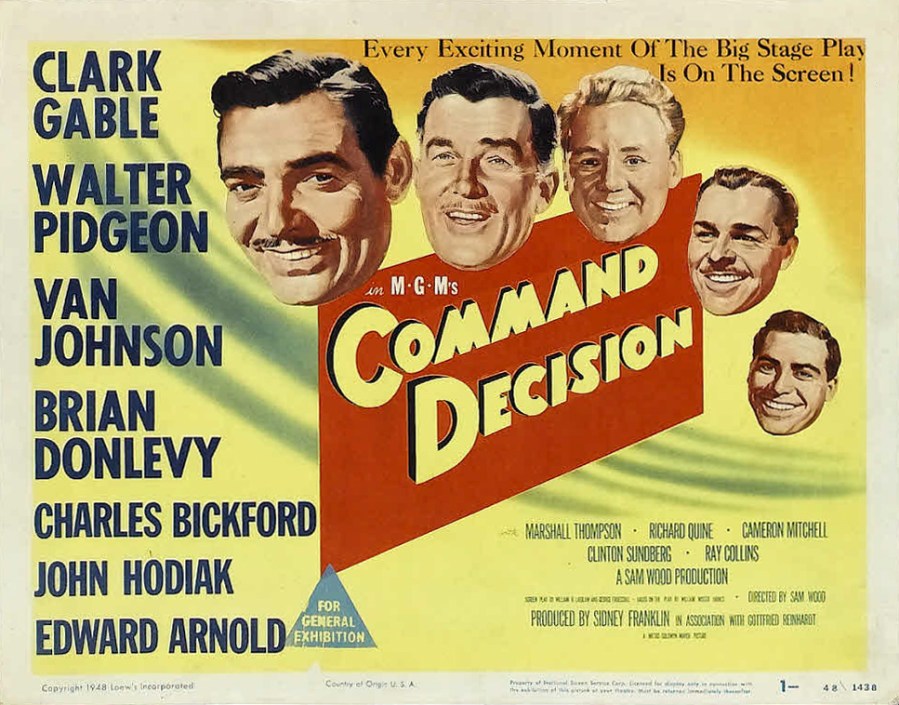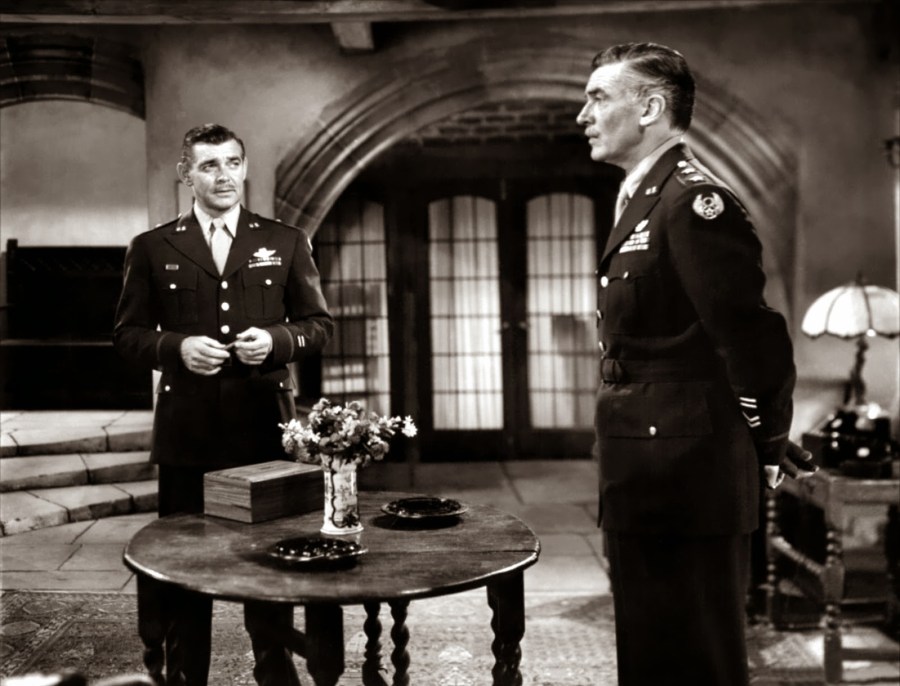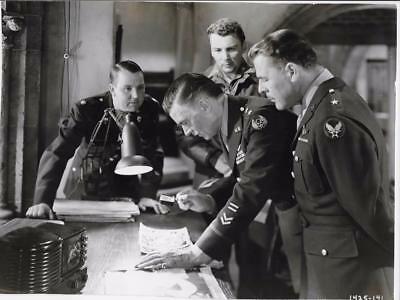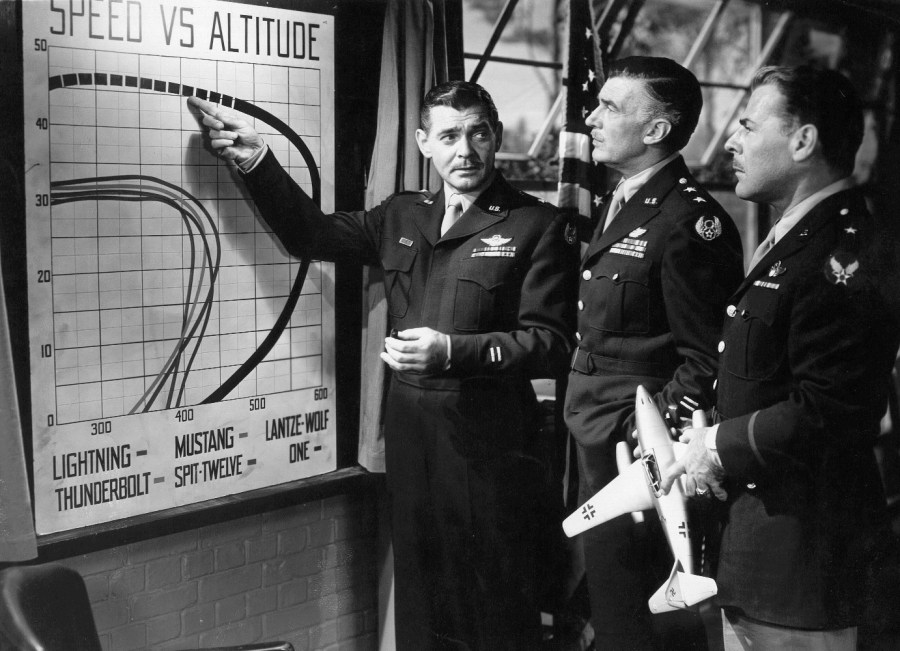- Today’s Movie: Command Decision
- Year of Release: 1948
- Stars: Clark Gable, Walter Pidgeon, Van Johnson
- Director: Sam Wood
This movie is on my list of essential films.
NOTE: This installment of Sports Analogies Hidden In Classic Movies is being done as part of something called The Second Clark Gable Blog-A-Thon which is being hosted by Love Letters To Old Hollywood. The first time I participated in one of her blog-a-thons was also about a World War II movie featuring Van Johnson. He was the focus then, now it’s Clark Gable’s turn in a movie which is one of my favorites.
You can see all the contributions to this blog-a-thon here:
The Story:
The plot of this film is set in 1943 at the heart of the U.S. Eighth Air Force’s strategic bombing campaign against the industrial heart of Nazi Germany. Specifically, the focus is on the U.S. 5th Bomb Division and it’s commander, Brigadier General K.C. “Casey” Dennis (played by Clark Gable).
Early on, Dennis finds himself in a crisis. At first, war correspondent Elmer “Brockie” Brockhurst (played by Charles Bickford) attends the daily briefing on bombing missions, when the news is revealed that a record 48 bombers had been shot down attacking an undisclosed industrial target. As such, Brockhurst travels to Dennis’ headquarters just in time to see the B-17s of the 32nd Bomb Group taking off on another “maximum effort.”
At the same time, Dennis’ superior Major General Roland Goodlow Kane (played by Walter Pidgeon) arrives with Brigadier General Clifton Garnet (played by Brian Donlevy) in tow. Garnet is a West Point classmate of Dennis and brother-in-law to bomb group commander Colonel Ted Martin (played by John Hodiak). Garnet’s presence fires up the rumor mill; the thrust being he has been sent by the Pentagon to relieve either Kane or Dennis of their command. If that weren’t enough, Kane’s headquarters gets wind of the impending arrival of a visiting congressional committee, at which point Garnet tips his hand by pleading for “milk run” missions because more heavy losses may cause the Pentagon to re-think it’s position on strategic bombing.
In other words, Kane and Dennis find themselves trying fight a war while now being second-guessed by politicians. Now as old antagonists, Dennis and Brockhurst engage in another “military vs. press” skirmish. While Kane is trying (and failing) to mediate, Dennis spills the beans about the day’s targets. Once Kane hears the bombers have gone to Posenleben and Schweinhafen, he realizes Dennis has begun a major effort code-named “Operation Stitch;” a three-day series of attacks against strategically-vital targets deep in the heart of Germany. As such, they are heavily-defended and promise to incur a huge cost in men and planes.
The German targets offer a fierce defense exactly as expected; the day’s losses are even worse than the day before. Not only has the 32nd Bomb Group suffered a slaughter two days in a row, but Martin tells Dennis they have attacked the wrong target. As Dennis’s closest friend, Martin suggests they can keep the matter quiet as the two cities are indistinguishable. Dennis declines, but once he reveals to Kane that the industrial complex which was attacked in error was a torpedo factory, both Kane and Garnet see an opportunity to promote the mistake as a political chip showing cooperation with the U.S. Navy.
The lid comes off “Operation Stitch” once Brockhurst learns about the mistake. To gain his “Brockie’s” cooperation, Kane decides to trust him with the top secret goal of “Operation Stitch;” the destruction of factories where a secret German jet fighter is being built. It is imperative the production of these jets be stopped because once they enter service they will savage American strategic bombing.
In order to complete “Operation Stitch,” a third German city must be attacked, and only Dennis’ division is able to reach Fendelhorst, which is also beyond the range of escorting American fighters. Adding urgency to the situation is a rare stretch of clear weather is about to end, about to end, presents an opportunity to complete the operation before the Luftwaffe can mount an impenetrable defense.
Complicating matters even further is the matter of Schweinhafen, the city which was missed when the torpedo factory was mistakenly attacked. Dennis cares little about the political ramifications; he is focused on the importance of completing “Operation Stitch.” This places him on conflict with Kane, who denies permission to attack Schweinhafen again. But Dennis engages a bit of his own political shenanigans; he plays a bit of “blackmail” with Kane.
In his command, Dennis has a young captain named Jenks who refused to fly the original mission intended to go to Schweinhafen. Conveniently enough, this young captain just so happens to be the nephew of the aforementioned visiting Congressman Arthur Malcolm (played by Edward Arnold). Kane realizes he is politically outflanked once Dennis threatens to court-martial Jenks, thus he acquiesces and grants permission to continue “Operation Stitch.” As the game of “back-scratching” goes, in return Dennis agrees to award Jenks a medal during Malcolm’s visit.
The next day, the Congressman and his entourage offer collective “oohs and aahs” when the group thunders into the air headed for Schweinhafen, but once the bombers are gone, the bullets start flying Dennis and Malcolm. The Congressman bitterly accuses Dennis of recklessly causing heavy losses; needless to say this raises Dennis’ hackles. Matters come to a head when during the ceremony to decorate Jenks, Dennis gets a message that Schweinhafen has been destroyed, but Martin’s B-17 (of which Jenks is a member of the crew) has been shot down. This only increases Malcolm’s vitriol toward Dennis, but Jenks interjects telling his uncle to shut up, then he refuses his medal.
A visibly shaken Dennis excuses himself to plan the next day’s mission. Despite all that has just transpired, Kane is shocked to learn that Dennis intends to attack the remaining jet factory at Fendelhorst. Kane relieves Dennis of command and replaces him with Garnet. At first, Garnet queries his staff about ordering an easy mission for the next day, but during a conversation with Dennis in which he angrily mutters “You don’t have to worry about killing Ted Martin, I’ve ready done that for you,” Garnet realizes that the idea which lived throughout the film that Dennis loves the war is seriously in error. It becomes clear the Dennis has hated every minute of his command; knowing he was sending men to their deaths on a daily basis.
Dennis consoles himself with the idea he’s going back the the States to take over a training command. He’s looking forward to being near his his family until a message from the Pentagon orders him to the Pacific and a new B-29 command.
The Hidden Sports Analogy:
Whether its the military or big-time sports, one thing generals, general managers, and coaches have in common; they make decisions which affect people’s lives and often involve millions of dollars. Granted, military leaders have a lot more “life-and-death” in their realm, but player personnel moves and spending decisions involving contracts with two commas in the dollar amount will eat away one’s stomach lining just as easily.
That’s why I find it so completely laughable when the average dim-bulb sports fan starts talking about things they would do differently if they were a general manager and/or a coach. You can get the same bilge talking about politics, but since this isn’t “Political Analogies Hidden In Sports,” we’re aren’t going there.
In any event, the people who think they know better are usually guys who drive trucks or spend 40 some-odd hours a week engaged in hand-to-cubicle combat, but because they consume a steady diet of sports media, they think they’ve got this shit all figured out. Of course, this is the same mentality of the guy who offers you legal advice because he watches a lot of “Law and Order.”
That brings us to my favorite scene in this movie.
Walter Pidgeon’s extended rant is the heart of today’s hidden analogy; it’s all about who the real enemies are, because it blows the lid off only game dirtier than war itself…political in-fighting. When John Hodiak tells him “we have to protect the Air Force we have against the German jets,” Pidgeon tells him “those things are just our acknowledged enemy, at least they fight us out in the open!” Then Pidgeon proceeds to list no less than five internal political threats which threaten strategic bombing and air power in general as a means of winning the war.
This is exactly the stuff the “Monday Morning Quarterbacks” never think about. Worse yet, they will simply ignore things which are important for no other reason than they don’t understand them, but still expect me to take their opinions seriously. The perfect example comes in the form of one of those aforementioned cubicle-dwellers who tried to tell me his grand scheme for player personnel decisions for his favorite National Football League franchise. Of course, he completely ignores a pesky little detail known as the “Salary Cap.” Without getting into a morass of details, the Salary Cap is a limit teams can spend on payroll for players. The bottom line is Porky McCuberson’s theories completely ignored the Salary Cap, which made everything he said a monument to meaningless, and he doubled-down with this pearl of wisdom:
The Salary Cap doesn’t matter because there’s ways to get around it.
This is one of those statements which starts with a ring of truth…until you give it the most initial of thought. Of course there’s ways around the Salary Cap. There;s ways to cheat on your income taxes as well, but if you’re going to harbor even the slightest thought of getting away with it, you’d better understand the rules of the game. Porky is the kind of guy who cheats on his taxes by simply not filing a return, then can’t figure out why the Internal Revenue Service seized his bank account.
While on a much grander scale, Pidgeon’s empassioned monologue hits all the notes of the ramifications of political in-fighting; and they trickle-down from the realm of life-and-death to even the most mundane decisions. I kid you not, part of this very piece was written in a coffee house where I watched a newly-wed couple get into a squabble over a choice of morning beverage. But that’s exactly why Pidgeon’s words were so prescient, and they are completely exemplified by this movie’s own version of Porky McCuberson…Congressman Arthur Malcolm. This butt-loaf isn’t on-screen very long, but he spends most of that time running his mouth about matters to which he is completely clueless…and in doing so, he proves every single one of Pidgeon’s points.
What it comes down to is “Command Decision” is brilliant on two fronts. Most importantly, it does a wonderful job of explaining the burden of conscience carried by those whose job it is to send men to their deaths. But I never really caught on to another aspect of this film until I got my first management job. Clark Gable’s character endures no end of politically-based battles from his own side in addition to trying to fight the Germans, and I only wish I had understood what Walter Pidgeon was talking about years before I did.
Granted, I’m not ordering the 8th Air Force to attack Schweinhafen, but I’ve yet to make a decision that didn’t come with a lot of in-fighting.
The Moral of The Story:
Making decisions is hard. Second-guessing decision makers is easy. That’s why there’s that old adage about “heavy is the head which wears the crown.”
P.S. If there were an Academy Award for cigar smoking, it should be named for Clark Gable and Walter Pidgeon largely because of this movie.
P.P.S. If you really want that avalanche of detail on how the NFL Salary Cap works…well, I’ve got you covered.
Check out Dubsism’s Movies and Blog-A-Thons page for a full schedule of projects past, present, and future!
Got a question, comment, or just want to yell at us? Hit us up at dubsism@yahoo.com, @Dubsism on Twitter, or on our Pinterest, Tumblr, Instagram, Snapchat or Facebook pages, and be sure to bookmark Dubsism.com so you don’t miss anything from the most interesting independent sports blog on the web.













I find Command Decision continually fascinating due to the levels of details, roadblocks, and the personalities that compound and confound the life and death decisions. I think MGM did a beautiful job of transferring the play to the screen. I have no doubt this cast could have carried the material on stage as well.
PS: I know all about American law from Perry Mason! I know not to put anything in writing or to pick up a murder weapon.
– Caftan Woman
LikeLike
Here’s what I learned from Perry Mason: If your lawyer is Hamilton Berger, you’re screwed.
LikeLike
Ha, ha! I like your suggestion for a new Oscar category. This film has an excellent cast and I remember feeling rather tense as I sat through it, feeling the weight of responsibility sitting on the shoulders of the decision makers.
Another film I saw which impacted me the same way was Above and Beyond with Robert Taylor and Eleanor Parker. It really puts into perspective the price our military personnel pays, even when not in combat. Both of these films gave me a new found respect for those who not only sacrifice their lives, but their peace of mind, their families and much more.
LikeLike
I’m not familiar with Above and Beyond, but I will put it on my list!
LikeLike
I liked this film when I first saw it last year. Van Johnson’s character was my favorite, but everyone else was superb, too. While overall it was a bit too talky for me and I felt bogged down by the relentless strategizing, it does offer some very interesting ideas and does an admirable job in showing you a different kind of war movie.
Thanks for contributing to my blogathon!
LikeLike
[…] covered in this series borrowed somewhat from this one; “Fighter Squadron” and “Command Decision.” But “Dawn Patrol” has a hidden sports analogy all it’s own. Basil […]
LikeLike
[…] Command Decision (1948) […]
LikeLike